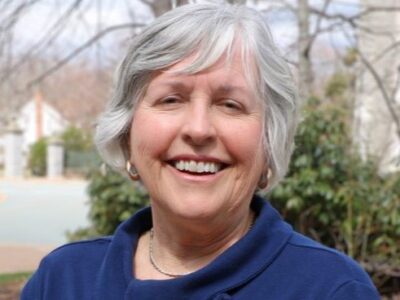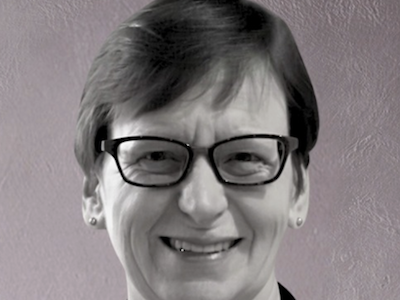 Francesca Allodi-Ross is the Executive Director of the Toronto-based Romero House, which provides transitional housing to refugee claimants, acting as a bridge between emergency shelter and permanent housing. The nonprofit organization runs four houses in Toronto’s west end — and is about to open a fifth in the same neighbourhood. It offers many other services and supports as well, and works with thousands of refugee claimants. She spoke to PANL Perspectives about the holistic approach Romero House takes when working with newcomers.
Francesca Allodi-Ross is the Executive Director of the Toronto-based Romero House, which provides transitional housing to refugee claimants, acting as a bridge between emergency shelter and permanent housing. The nonprofit organization runs four houses in Toronto’s west end — and is about to open a fifth in the same neighbourhood. It offers many other services and supports as well, and works with thousands of refugee claimants. She spoke to PANL Perspectives about the holistic approach Romero House takes when working with newcomers.
Question: What does Romero House do, and why is its approach so successful?
Francesca Allodi-Ross: We’re a community that welcomes refugee claimants. We’re a nonprofit housing provider for refugees when they first come to Canada. They live with us for about a year. We also work with refugee claimants who live outside of Romero House: last year, we supported 1,500 claimants with immigration and settlement needs.
We welcome refugees differently; we welcome them as neighbours, not just as tenants or social work clients. That’s the heart of what we do. It’s different from being a shelter or temporary hotel. We provide them with community as well.
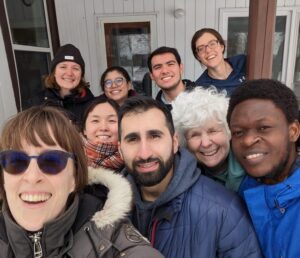 I live in one of the houses, and living at work isn’t for everybody, but I get a lot out of it. I don’t have to do the direct client work with the families who I live with, but it keeps me connected to why we’re doing what we’re doing. Those personal relationships are very meaningful, and they motivate me. I’ve been the Executive Director for two and a half years, and I’ve been part of the community for more than 15 years, when I started as a summer intern.
I live in one of the houses, and living at work isn’t for everybody, but I get a lot out of it. I don’t have to do the direct client work with the families who I live with, but it keeps me connected to why we’re doing what we’re doing. Those personal relationships are very meaningful, and they motivate me. I’ve been the Executive Director for two and a half years, and I’ve been part of the community for more than 15 years, when I started as a summer intern.
Question: Can you walk me through some of the innovative ways you work with refugee claimants?
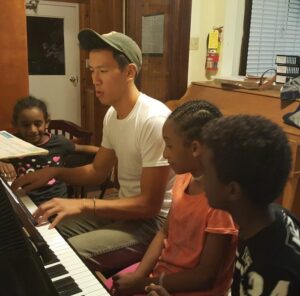 Francesca Allodi-Ross: The heart of what we do is the transitional housing; staff and volunteers live in the houses alongside families. We help them to navigate the refugee process, enrol in school, find work, access mental health supports and access all the things required in a new country. We provide a food bank, a clothing bank, and support for things people need (diapers, menstrual products, hygiene products and more).
Francesca Allodi-Ross: The heart of what we do is the transitional housing; staff and volunteers live in the houses alongside families. We help them to navigate the refugee process, enrol in school, find work, access mental health supports and access all the things required in a new country. We provide a food bank, a clothing bank, and support for things people need (diapers, menstrual products, hygiene products and more).
And we connect refugee claimants with the many employment supports in our communities for help with cover letters, resumes and job-search tools. We offer English conversation partners and circles because English is often a barrier for refugee claimants who don’t speak the language when they arrive. Finally, we connect claimants with friends and neighbours who can offer odd jobs, or sometimes networks that help them find permanent jobs.
Then we have our walk-in program, which offers a lot of those same supports to families and individuals who don’t live with Romero House, supporting them to understand the refugee process, find shelter or housing, find a lawyer, and supporting them with other services.
A third initiative is our Community Host Program, in which neighbours or supporters provide an extra bedroom or a couch — a safe place to sleep, because oftentimes, people are forced to sleep outside. Community hosts support a refugee for a time, usually a few months, until the newcomers can find permanent housing, because the shelters in Toronto are full. We also support refugees after they move out of Romero House through our alumni program.
Question: What can be done better in terms of funding or policies for your sector?
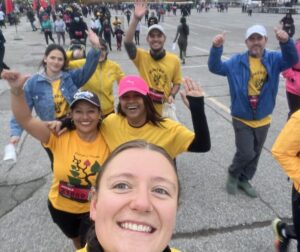 Francesca Allodi-Ross: We’re growing this year, opening a fifth building, and doubling the number of families that we house. That funding, to lease the building, is coming primarily from the City of Toronto. But there are restrictions on public funding, and we need to fundraise for the wraparound support and community programming that makes Romero House what it is.
Francesca Allodi-Ross: We’re growing this year, opening a fifth building, and doubling the number of families that we house. That funding, to lease the building, is coming primarily from the City of Toronto. But there are restrictions on public funding, and we need to fundraise for the wraparound support and community programming that makes Romero House what it is.
We’re very lucky to have quite a few donors and supporters who have known us for 30 years and give us funds that we can use in a general way. This allows us to be nimble and responsive to emerging needs. We’re a relatively small organization, and our donors trust us. It’s important in our sector to have flexible funding, and I encourage governments and foundations to move in that direction.
It’s also important to defend the ability of charities to engage in policy work. We are involved in many Advocacy programs. We’re a member of the Ontario Coalition of Service Providers for Refugee Claimants, which includes refugee houses and agencies who work with vulnerable populations.
We see a lot of similar problems over and over, and we’re in regular communications with immigration officials and Canada Border Services Agency officials. So, with many of our partners in the sector, such as the Ontario Council of Agencies Serving Immigrants, we advocate for change at a systemic level.
I was glad to see changes by the Canada Revenue Agency a few years ago to remove restrictions on political activities by charities. We’re never partisan but we do advocate for policy change. We can have a much bigger impact improving the lives of those we serve by combining front-line social service work with advocacy to address systemic issues.
Romero House is on LinkedIn. Photos are courtesy of Romero House.
Sign up for PANL Perspectives, MPNL’s free newsletter.
Friday, September 27, 2024 in For homepage, Newcomers & Youth, Social Justice & Change
Share: Twitter, Facebook

